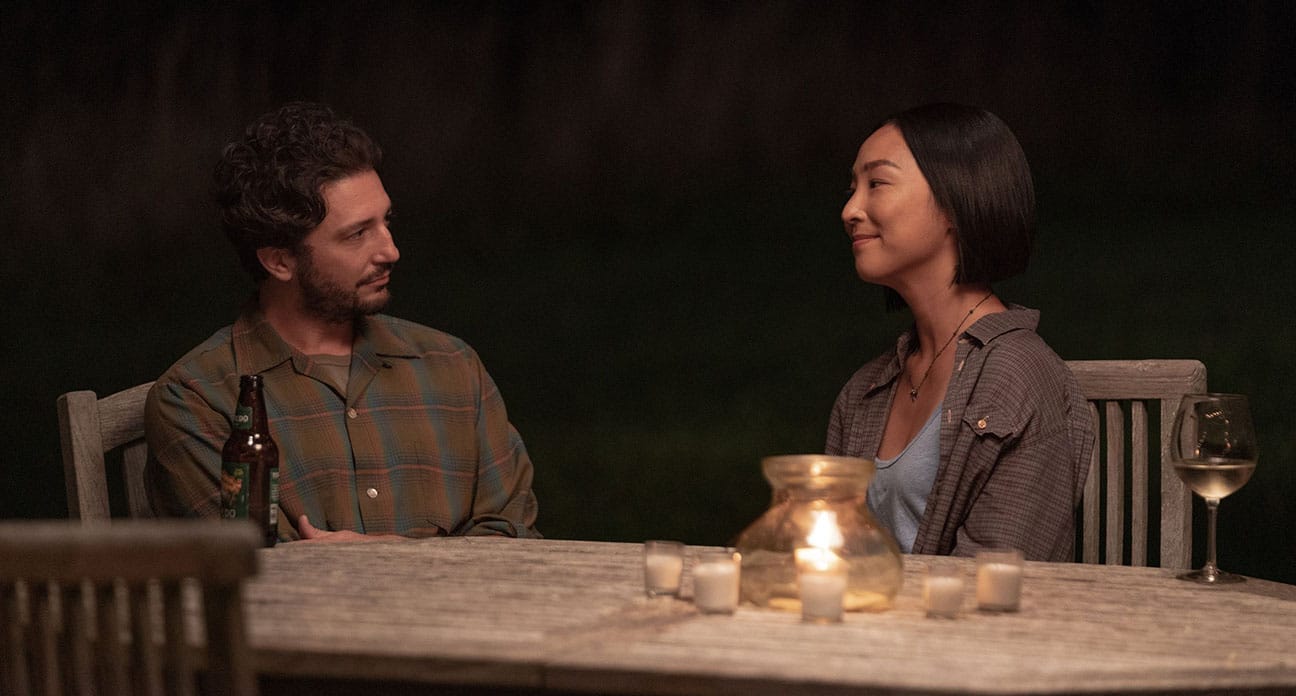
In “Past Lives,” nominated for Academy Awards for Best Picture and Best Original Screenplay, Nora (an excellent Greta Lee playing a character with much less sass than her performance on Apple TV’s “The Morning Show”) and Hae Sung (Teo Yoo) meet up after not seeing each other for more than 20 years. They had crushes on each other when they were young but she and her family were leaving Korea for Canada.
A decade later, Nora has moved to New York, and they reconnect online, but Nora breaks things off, worried that Skype-ing with Hae Sung is keeping her from committing to her American life. Twenty years later, Nora is married to Arthur Zaturansky, played by John Magaro, while Hae Sung — still in Korea, living with his parents — flies to New York to see Nora. At first, Arthur is not threatened by the prospect of her childhood crush visiting. But then he asks if she thinks Hae Sung is attractive and she says he is, but not to her, then she says she doesn’t know.
Later that night, in bed, he makes his concern concrete.
“Is this what you pictured for yourself?,” he asks, “lying in bed in some tiny East Village apartment with some Jewish guy who writes books?”
Is that what her parents wanted for her.
In a lesser film, that would be when Nora professes her love or says maybe she made a mistake and she’s not sure what she wants.
Is she happy, he asks. Answering very calmly and evenly, Nora tells him “This is where we ended up. This is where I’m supposed to be.”
At first glance, one might think Arthur is belittling his Jewishness. But he is simply noticing their differences. Nora is surprised by how Korean Sae Hung is. Arthur says he can’t compete with the story of a reconciliation after many years.
Song doesn’t simply plant a seed of doubt in the head of the audience. She plants a forest. Arthur tries to imagine how their life would be told in a book: “In the story, I would be the evil white American husband standing in the way of destiny.”
Nora insists she and Hae Sung are not meant for each other, with no explanation why. Nostalgia is one thing, but is harping on such a belief healthy? What about the risks of a fantasy becoming a nightmare?
Hae Sung is a bit of a contradiction. He is polite to an absurd degree but has no problem having a long and sensitive conversation with Nora at a bar in Korean, while Arthur sits right next to them and has no idea what they are saying. It’s almost as though Arthur calculates that if he appears cool and not worried, nothing will happen between them even though he can see they look at each other with lust, love, or some combination of both, ignoring him.
Whereas films like “The Zone of Interest” and “Anatomy of a Fall” use silly gimmicks in a feeble attempt to seem profound (we see the outside of Auschwitz but don’t see the carnage of many Jews murdered, though we hear some cries and gunshots; in “Fall” we don’t see the fall or a crucial argument between spouses but only hear a recording) “Past Lives” uses a simple technique of setting the viewers up to wish for a certain outcome, waiting to see if it will be granted or our bubble will burst. Though there is little razzle dazzle and not much of a plot, “Past Lives” has a purity and provocativeness with unpolished dialogue and big questions. The film opens with a people- watching scene of the three and we hear voices wondering if they are tourists or the woman is married to one of the guys, with a woman asking: “What do you think they are to each other?”
In the final scene there is a great degree of sexual tension between Hae Sung and Nora. It seems that they want each other.
Perhaps there is a couple you see at a restaurant that looks unhappy, but they really love each other and things are fine. Or perhaps you see a couple that are holding hands and kissing, but they are in turmoil and want to be rid of each other. The adage is that it is better to have loved and lost than to never have loved at all. Arthur never asks if Nora loves him or if she loves Hae Sung but she says they were never physical. I did not recall the word “love” being used even once.
Yeo is extremely effective as a man who can barely allow himself to accept a hug from the woman he wants, and while likely lamenting he never acted on his attraction, and wonders if there could still be a chance to do so.
The film gets its title from the notion that there are other lives where relationships may have been different as well as the time when they were young and thought they might be on track to be together. “Past Lives” walks an emotional tightrope but never loses its balance due to strong writing and performances.

































 More news and opinions than at a Shabbat dinner, right in your inbox.
More news and opinions than at a Shabbat dinner, right in your inbox.